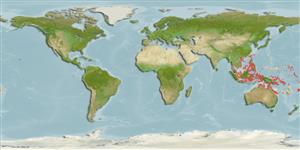Common names from other countries
>
Gobiiformes (Gobies) >
Microdesmidae (Wormfishes) > Ptereleotrinae
Etymology: Parioglossus: Greek, pareia = jaw + Greek, glossa = tongue (Ref. 45335).
More on author: Smith.
Environment: milieu / climate zone / depth range / distribution range
Ekologi
laut; payau berasosiasi dengan karang; kisaran kedalaman 0 - 15 m (Ref. 48444). Tropical; 25°N - 24°S
Western Pacific: Gulf of Thailand to Fiji, north to Yayaema Islands, south to northwestern Australia and the southern Great Barrier Reef.
Size / Weight / umur
Maturity: Lm ? range ? - ? cm
Max length : 4.5 cm SL jantan/; (Ref. 48637)
deskripsi pendek
Morfologi | Morfometrik
Duri punggung (Keseluruhan (total)): 6 - 7; duri punggung lunak (Keseluruhan (total)): 13-15; Duri dubur 1; Sirip dubur lunak: 13 - 15.
Occurs in shallow coastal reefs and mangrove-lined inlets. Hovers in schools among branching corals or mangroves to a depth of about 4 meters.
Life cycle and mating behavior
Kematangan | Reproduksi, perkembang biakan | Pemijahan | telur-telur | Fecundity | Larva
Myers, R.F., 1991. Micronesian reef fishes. Second Ed. Coral Graphics, Barrigada, Guam. 298 p. (Ref. 1602)
Status IUCN Red List (Ref. 130435)
CITES (Ref. 128078)
Not Evaluated
ancaman kepada manusia
Harmless
penggunaan manusia
informasi lanjut
Umur / SaizPertumbuhanpanjang-beratpanjang-panjangukuran frekuensiMorfometrikMorfologiLarvaDinamika larvapemulihanKelimpahan
AcuanBudidaya airprofil budidaya airStrainGenetikaElectrophoresesDiturunkanPenyakit-penyakitPengolahanMass conversion
mitraGambarStamps, Coins Misc.Suara-suaraCiguateraKecepatanTipe renangArea insangOtolithsOtakPenglihatan / visi
Alat, peralatan
laporan khas
muat turun XML
Sumber internet
Estimates based on models
Preferred temperature (Ref.
115969): 26.1 - 29.3, mean 28.7 (based on 1701 cells).
Phylogenetic diversity index (Ref.
82804): PD
50 = 0.5000 [Uniqueness, from 0.5 = low to 2.0 = high].
Bayesian length-weight: a=0.00389 (0.00180 - 0.00842), b=3.12 (2.94 - 3.30), in cm Total Length, based on all LWR estimates for this body shape (Ref.
93245).
Trophic level (Ref.
69278): 3.2 ±0.4 se; based on size and trophs of closest relatives
Fishing Vulnerability (Ref.
59153): Low vulnerability (10 of 100).
